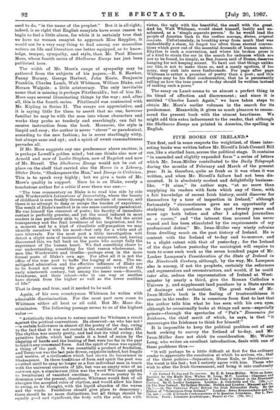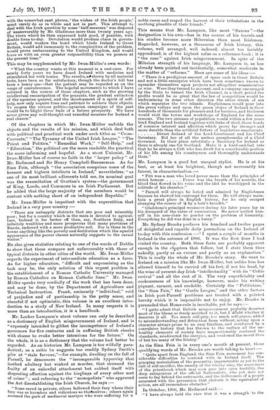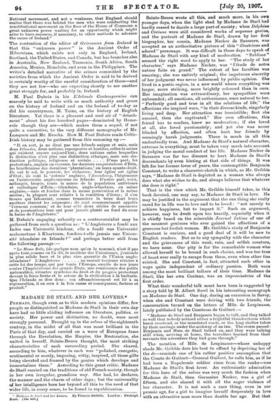FIVE BOOKS ON IRELAND.*
THE first, and in some respects the weightiest, of these inter- esting books was written before Mr. Birrell's Irish Council Bill ran, like a startled hare, across the political stage. It contains "in amended and slightly expanded form" a series of letters which Mr. Iwan-Miiller contributed to the Daily Telegraph during the months of February and March of the present year. It is, therefore, quite as fresh as it was when it was written, and when Mr. Birrell's failure had not been dis- counted. It is absolutely modest and delightfully business- like. "It aims," its author says, "at no more than supplying its readers with facts which any of them, with a fair knowledge of recent Irish history, could discover for themselves by a tour of inspection in Ireland," although fortunately "circumstances gave me an opportunity of studying Irish questions on the spot twenty years and more ago both before and after I adopted journalism as a career," and "the interest then aroused has never waned and has been stimulated by the requirements of my professional duties." Mr. Iwan-Miiller very wisely refrains from dwelling much on the past history of Ireland. He is content with the Ireland of to-day and to-morrow, and to a slight extent with that of yesterday ; for the Ireland of the days before yesterday the sociologist will require to turn to some such work as the seven hundred pages of Mr. Locker Lampson's Consideration of the State of Ireland in the Nineteenth Century, although, by the way, Mr. Lampson also is among, if not the prophets, certainly the reformers and regenerators and reconstructors, and would, if he could inter alia, reduce the representation of Ireland at West- minster by nearly a third, give the Roman Catholics a Univers y, and supplement land purchase by a State system of drainage and reclamation. The great value of Mr. Iwan-Miiller's book is the feeling of trustworthiness it creates in the reader. He is conscious from first to last that the author tells him what he has seen with his own eyes, although he occasionally looks at things and men—especially priests—through the spectacles of " Pat's " Economics for Irishmen, the chief merit of which, he says, is that "it encourages the Irishman to think for himself."
It is impossible to keep the political problem out of any book seeking to survey the Ireland of to-day, and Mr. Iwan-Miiller does not shirk its consideration. Mr. Walter Long, who writes an excellent introduction, deals with one of these problems thus :—
"It will perhaps be a little difficult at first for the ordinary reader to appreciate the conclusion at which he arrives, viz., that of the three policies—Separation, Home Rule, or Devolution— the worst is the last ; but I entirely agree with him. Those who wish to alter the Irish Government, and bring it into conformity dUct(,i1OsIrie3lyantt To-day and To-morrow. B Walter .H B. issen.nali" W lgel. [3s. 6c1.1e—ise.dillienneid. London: ciax an Intro- u By G. Lo er eret"LontitlIng:ngleRitjOePfetr:. gall& By Sydneysbrel and Co. the Pei 11 asfe (3)eThreyhre Dublin and MCeann. lilia; CO Unknown PoItoreerlathirti'd the Irish Nationaliet se. ri5clitonerLojf—"%encleas from o nneuPsache the n G inpoiaine Ito la nbois. Paris : Libraities :need rnique ; Perrinalitcien. rItg."sre.) Par D.draui with the somewhat cant phrase, the wishes of the Irish people,' must surely do so in whole and not in part. This attempt to deal with the Irish question by some 'half-measure' was disposed of unanswerably by Mr. Gladstone more than twenty years ago. The views which he then expressed hold good, if possible, with double force to-day. Devolution would produce chaos in govern- ment, would weaken the bond which binds Ireland to Great Britain, would add immensely to the complexities of the problem, would prove embarrassing to the United Kingdom, and would leave us with an even greater responsibility than we possess at the present time."
This may be supplemented by Mr. Iwan-Miiller's own words:
"What the country wants at this moment is a rest-cure. For nearly forty years we have dosed Ireland with medicine and stimulated her with tonics. The results, af shown by all material tests, have been so far satisfactory, though the doctor's bill has been a heavy one—that the patient may be m as on the verge of convalescence. The hopeful movements to which I have referred in the course of these chapters, such as the growing intellectual emancipation of the peasants, the gradual extinction of the agrarian quarrel, and the development of a spirit of self- help, now only require time and patience to achieve their objects. To reopen the serious politico-agrarian campaigns of the past would be to blight these buds of a future prosperity. We have never given any well-thought-out remedial measure for Ireland a real chance."
Of the chapters in which Mr. Iwan-Miiller unfolds the objects and the results of his mission, and which deal both with political and practical work under such titles as "Cross- Currents," "The Tyranny of the United Irish League," "The Priest and Politics," "Remedial Work," "Self-Help," and "Education," the political are the more readable, the practical the more informing and hopeful. As a stout Unionist, Mr. Iwan-Miiller has of course no faith in the "larger policy" of Mr. Redmond and Sir Henry Campbell-Bannerman. As for Sinn Fein, although "the association comprises some of the keenest and highest intellects in Ireland," nevertheless, "as one of its most brilliant adherents told me, its nominal goal was the resuscitation of Grattan's system—the government of King, Lords, and Commons in an Irish Parliament. But he added that the large majority of the members would be content with nothing short of an independent Republic."
Mr. Iwan-Miiller is impatient with the superstition that Ireland is a very poor country :—
"There are unhappily districts that are poor and miserably poor ; but for a country which in the main is devoted to agricul- ture, Ireland is far better off than, say, Southern Italy, and infinitely wealthier and more prosperous that many provinces of Russia, endowed with a more productive soil. Nor is there in the towns anything like the poverty and destitution which the squalid appearance of the poorer classes naturally suggests to the casual visitor."
He also gives statistics relating to one of the wards of Dublin to show that these compare not unfavourably with those of typical districts in other cities of the world. Mr. Iwan-Miiller regards the experiment of intermediate education as a farce. As for higher education, "difficult and unpromising as the task may be, the only solution of this urgent problem is the establishment of a Roman Catholic University managed by Roman Catholics on Roman Catholic lines." Mr. Iwan- Muller speaks very cordially of the work that has been done, and may be done, by the Department of Agriculture and Technical Instruction. Frank, eminently "individual," void of prejudice and of partisanship in the petty sense, and cheerful if not optimistic, this volume is an excellent intro- duction to a study of New Ireland. In many respects it is more than an introduction, it is a handbook.
Mr. Locker Lampson's stout volume can only be described as a dictionary of English misgovernment of Ireland, and is "expressly intended to gibbet the incompetence of Ireland's governors for five centuries and in suffusing British cheeks with shame to evoke better intentions for the future." On the whole, it is as a dictionary that the volume had better be regarded. As an historian Mr. Lampson is too wilfully para- doxical; as a critic he suggests too readily Sydney Smith's gibe at "stale fervour,"—for example, dwelling on the fall of Parnell, be denounces the "incomparable hypocrisy that loathed adultery but winked at murder, that shunned the frailty of an unlawful attachment but rubbed itself with disgusting affection against the hirelings of every other sort of crime" ;. and referring to the " monopolists " who approved the Act disestablishing the Irish Church, he says :— "Some raved in private, others bellowed their fury where their fury was as harmless and ridiculous as thefaselves; others again assumed the garb of mediaeval martyrs who were suffering for a
noble cause and reaped the harvest of their tribulations in the soothing plaudits of their friends."
This means that Mr. Lampson, like most "Saxons "—the designation is his own—has in the course of his travels and his studies become more Hibernian than most Irishmen. Regarded, however, as a thesaurus of Irish history, this volume, well arranged, well indexed, almost too lavishly appendixed, is of the highest value as a reference-book ; it is "the case" against Irish misgovernment. In spite of the Milesian strength of his language, Mr. Lampson is, as has already been pointed out incidentally, somewhat moderate in the matter of "reforms." Here are some of his ideas :— " There is a prodigious amount of spare cash in Great Britain and not a little enterprise which have been sometimes known to squander themselves upon projects not altogether remunerative or wise. Were they turned to account, and a company encouraged by the State to tunnel the Irish Channel, in a short period the profits would be so great that the law of competition would be undermining in some other direction the silver streak of sea which separates the two islands. Englishmen would pour into the green valleys and upon the green slopes of Ireland in their hundreds of thousands for pleasure and for busiuess, and Irishmen would visit the towns and workshops of England for the same reasons. The two streams of population would within a few years bind England and Ireland together with links of steel, those bonds of common interest and affection which prove far stronger and more durable than the artificial fetters of legislative enactments. Divest Ireland of the Lord-Lieutenant and his Chief Secretary. Rid her of all the useless paraphernalia of a Chief Governor. In their place substitute a Secretary for Ireland as there is already one for Scotland. Make it a hard-and-fast rule that he be always a Celt who has dwelt for a considerable portion of his life among his countrymen and thoroughly understands them."
Mr. Lampson is a good but unequal stylist. He is at his best, or at least his brightest, though not necessarily his fairest, in characterisation :—
"Pitt was a man who loved power more than the principles of strict honour Power was the breath of his nostrils, the blood that flowed in his veins and the idol he worshipped in the solitude of his chamber."
"Purcell will always be bated and admired by Englishmen because he showed his contempt for them. He will always main- tain a great place in .English history, for he only escaped changing the course of it by a hair's breadth."
"Gladstone's principal weakness during his later years lay in his disregard of the value of rumination. He never settled him- self in his arm-chair to ponder on the problem of humanity. Everything he did was done in a hurry."
Mr. Sydney Brooks prefaces his hundred and twelve pages of delightful and capable daily journalism on the Ireland of to-day with this confession :—" I spent a couple of months in Ireland in the autumn of 1906. It was the first time I had visited the country. Both these facts are probably apparent enough in the chapters that follow, but I state them thus nakedly, partly as an excuse and partly as an explanation." This is really the whole of Mr. Brooks's story. He went to Ireland on a mission like Mr. Iwan-Miiller, but unlike him has allowed himself to be carried off his feet, if not his head, by the wine of present-day Irish "intellectuality" with its "Celtic revival" and all the rest of it. The very superficiality and cocksureness of his knowledge, however, make his writing piquant, earnest, and readable. Certainly the "Politicians," the "Sine Fein," the "Gaelic League," and the other factors in Irish post-Parnell problems are treated with a pointed brevity which it is impossible not to enjoy. Mr. Brooks is persuaded that Home-rule is inevitable, yet he says :— "I quite admit that British misgovernment probably deserves most of the blame so freely ascribed to it, but I dOubt whether it deserves it all. Too much self-pity, too much self-praise, added to misunderstanding and detraction from without, acting upon a character always prone to an easy fatalism, and reinforced by a convulsive history that has thrown to the surface all the un- healthy elements of society have unquestionably confused the standards, misdirected the energies, and weakened the moral fibre of but too many of the Irishry."
As the Sinn Fein is in every one's mouth at present, these qualifying words of Mr. Brooks are worth taking to heart:— "Quite apart from England, the Sian Fein movement has con- siderable • difficulties to contend with in Ireland itself. The grasping materialism of the peasantry, impenetrable as yet to the call of self-sacrifice, the enmity of the whisky ring, the uneasiness of the priesthood, which may soon pass into open hostility, the deep antagonism of the official Nationalists, who yet dare not seem to lag behind the extremists, and the listlessness of a people saturated with the persuasion that rhetoric is the equivalent of action, are all tremendous obstacles."
In October, 1906, Mr. Redmond said :—
"I have always held the view that it was a strength to the
National movement, and not a weakness, that England should realise that there was behind the men who were conducting the constitutional movement on the floor of the House of Commons a great unknown power waiting for an opportunity whioh might arise to have recourse, if necessary, to other methods to advance the cause of Ireland."
The contention of the editor of Grievances from Ireland is that this "unknown power" is the Ancient Order of Hibernians, which exists not only in England, Ireland, Scotland, the United States, and Canada, but has branches also in Australia, New Zealand, Tasmania, South Africa, South America, Mexico, Honolulu, and even in the Philippines. The writer's detailed narrative of the crimes committed by the societies from which the Ancient Order is said to be derived is certainly worthy of the careful consideration of those—and they are not few—who are expecting shortly to see another great struggle for, and probably in, Ireland.
M. Paul Dubois in his L'Irlande Contemporaine can scarcely be said to write with as much authority and grace on the history of Ireland and on the Ireland of to-day as did his countryman, M. Taine, on the history of English literature. Yet there is a pleasant and cool air of "detach- ment" about his five hundred pages—dominated by Home- rule though they are—which makes them a sequel, if not quite a corrective, to the very different monographs of Mr.
Lampson and Mr. Brooks. How M. Paul Dubois reads Celtic- Irish history may be gathered from this summing up :—
"Ii en sort, je ne dirai pas une Irlande unique et nnie, mais dear Irlandes, deux nations, superposees et hostiles, celles-la, meme qui existent encore aujourd'hui; dear nations entre lesquelles la distinction n'est plus une distinction ethnique, mais une dis- tinction politique, religieuse et sociale D'une part, les protestants, anglais on ecossais, lea derniers conquistadores d'grin, lea beneficiaires des dernieres 'plantations,' on leurs ayants-droit. Ils out le sol, le pouvoir, les richesses ; leur eglise est eglise d'Etat; us sont la 'colonie' anglaise, l'Ascendency, Thegemonie on l'aristoeratie anglo-saxonne en Irlande. D'autre part, voici, melangee, broyee, toute la masse de In population anterieure et catholique d'Erin,—irlandaise, anglo-irlandaise, on meme anglaise,—unie et fondue dans la memo persecution et la meme misere ; la plupart sent recluits a la condition d'ilotes ; ii s'en trouve qui labourent, comma tenanciers la terra dont leurs ancetres etaient lea seigneurs ; us Bout cornmunement appeles l'ennemi commun,' et de leur cete dear siecles de massacres at de persecutions leur ont pour jamais plante au fond du cceur la haine de l'Angleterre."
M. Dubois's engaging urbanity as a controversialist may be gathered from such a question as : " L'Angleterre a fonde aux Irides une Universite hindoue, elle a fonde une Universite mahonietane h Khartoum, fondera-t-elle jamais une Univer- site irlandaise en Irlande ?" and perhaps better still from the following passage :— " Le Home Rule, (de quelque nom qu'on le nomme), n'est il pas apres tout, comma on l'a dit, le meilleur des Unionismes, j'entends is plus solide base et in plus sfire garantio de l'Union angle-
irlandaise L'Angleterre no saurait toujours resister a cette loi des temps, qui par toute l'Europe, suscite de nos jours contra l'Imperialisme des grands Etats, tine renaissance des petits nationalites, vivantes symboles du droit et du progres protestant devant la force brute at le retour de in civilisation a la barbarie. Qua l'Irlande se dise done: son affranchissement eat lie a sa regeneration, il en sera b. In fois cause at consequence, facteur et produit."








































 Previous page
Previous page